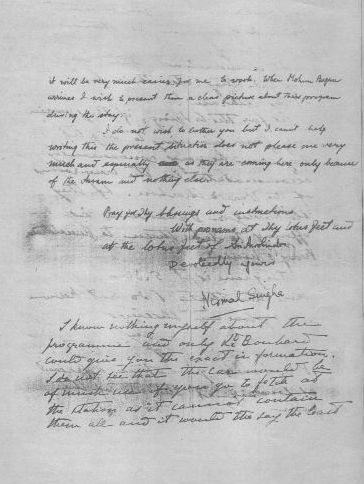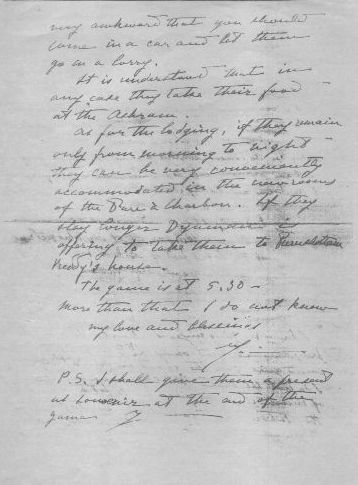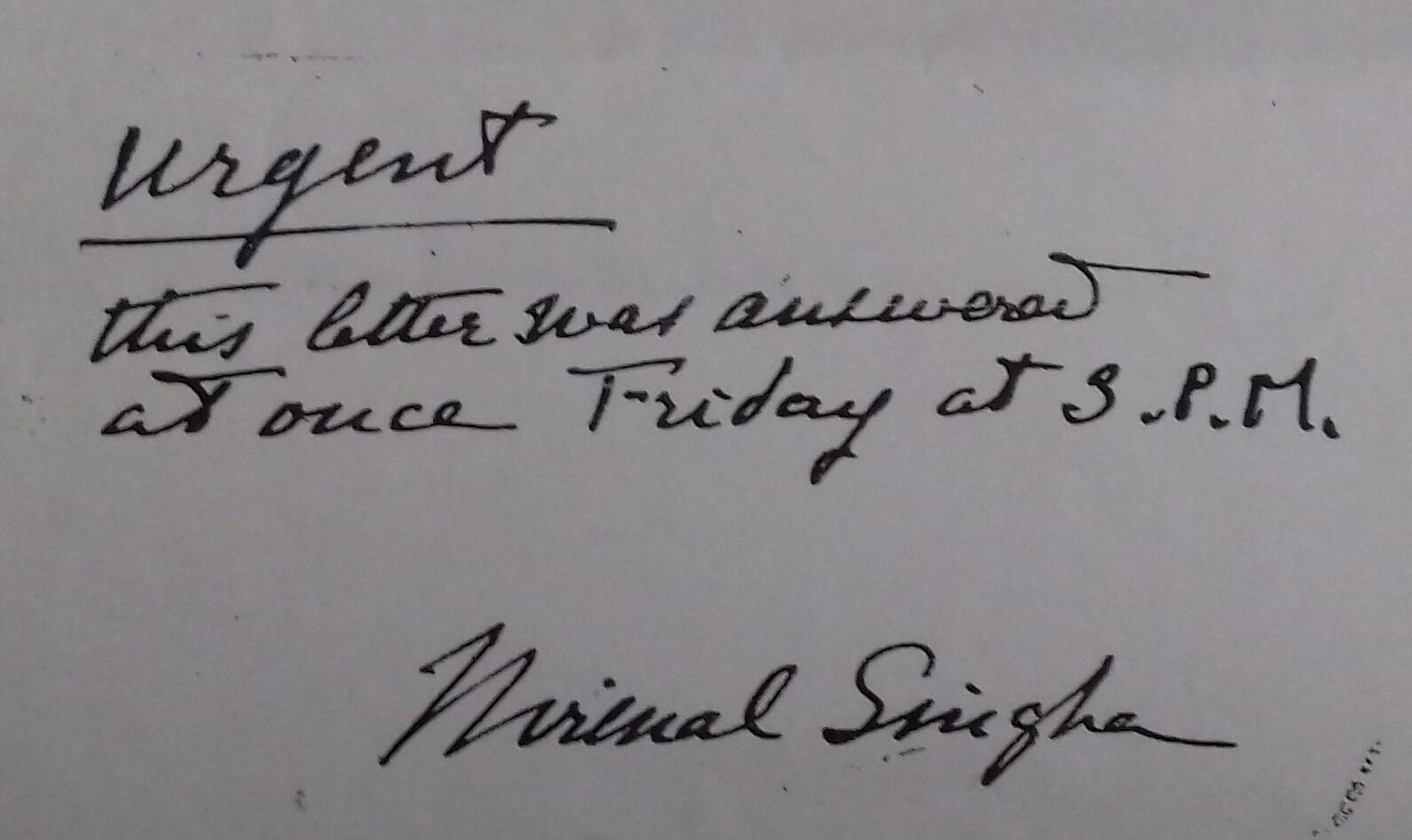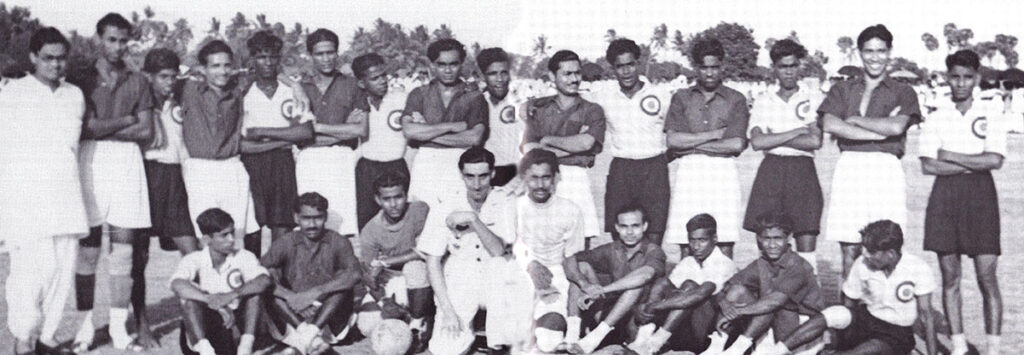
Dear Friends,
A journalist and freedom fighter, son of Prithwi Singh Nahar—a noted sadhak, poet, litterateur, disciple of Sri Aurobindo and the Mother—and mother Suhag Kumari; grandson of Puran Chand Nahar—a noted Indologist, scion of the well-known Zamindar family of Nahars of Azimgunj, Murshidabad, West Bengal— Nirmal Singh Nahar (28 July 1922—3 September 2012) belonged to the Swetambar Murtipujak Oswal Jain sect.
Born at Kolkata, educated at Santiniketan from 1929 to 1935 during Rabindranath Tagore’s golden period, Nirmal Singh did his schooling from South Suburban Branch School where he was initiated to the student movement. He raised the national flag in the school building and as a result he was transferred to South Suburban Main School. At the Main School, along with other students, he raised funds for flood relief work and handed over the same to the Congress President, Subhas Chandra Bose, in 1939.
During this period he was initiated to the freedom movement by Phani Majumdar—a Forward Block leader and Lieutenant of Subhas Chandra Bose who later became a minister under Sheikh Mujibur Rahman of Bangladesh.
After the disappearance of Subhas Chandra Bose, Nirmal Singh was directed by Phani Majumdar to go underground to avoid arrest. So he gave up his studies and left for their Zamindari Estate at Dinajpur. There he joined his uncle Bikram Singh Nahar and elder brother Dhir Singh Nahar in starting the Nahar Farm and was entrusted to look after their agricultural farm at Nijpara, Birgunj in Dinajpur district (now in Bangladesh), a remote village 18 miles away from the nearest railway station. He cleared the jungle and bush and started farming after reclaiming 60 acres of land.
In 1943 Nirmal Singh started agricultural farming at Sri Aurobindo Ashram, Pondicherry under the guidance of the Mother. He was the official referee of football and volleyball at Pondicherry, the capital of French India. In 1947, he joined Reuters Associated Press of India and Press Trust of India as their special correspondent. In 1951, he was declared a persona non grata by the French Indian government and a warrant of arrest was issued for exposing French misrule in India as a journalist, but he was smuggled out of Pondicherry by the then Indian Consul General. On returning to Kolkata he joined a Bengali daily, Jana Sevak, as its chief reporter. After leaving journalism he became a promoter of the Haldia Scooter Project in collaboration with an Italian firm, Armachie Harley-Davidson SPA, in 1964.
Nirmal Singh was an author and contributor of articles in Bengali and English journals on spirituality and economics. His first book Sri Aurobindo and His Birth Place was published in 1990. He also co-edited Sujata Nahar: Loving Homage with Anurag Banerjee.
Nirmal Singh was one of the founder members of Sri Aurobindo Society of West Bengal at Sri Aurobindo Bhavan in Kolkata, nominated by the State Government in 1972. He was also a member of West Bengal State Sri Aurobindo Birth Centenary Celebration Committee set up by West Bengal State Government in 1971. He was a member of the Governing Council of All India Sri Swetambar Murtipujak Jain Tirth Raksha Trust and Trustee of Murushidabad Sangh Nahar Family Trust, and a Founder-Member of Overman Foundation.
An unpublished article titled Mohun Bagan at Sri Aurobindo Ashram, Pondicherry penned by Nirmal Singh Nahar was found in his papers after his demise. This article which deals with a very interesting theme along with the Mother’s unpublished letter is being published for the first time in the website of Overman Foundation.
With warm regards,
Anurag Banerjee
Founder,
Overman Foundation.
Mohun Bagan at Sri Aurobindo Ashram, Pondicherry
It was in the year 1948, Mohun Bagan Football Club made a day’s visit to Sri Aurobindo Ashram, Pondicherry to play an Exhibition Football Match with PONDICHERRY XI.
As I came to know that Mohun Bagan will participate in the Gold Cup at Madura (Madurai), I sought the Mother’s permission to invite them on behalf of the Ashram to come down to Pondicherry on their way back from Madurai to play an Exhibition Football Match. When I sought the permission from the Mother through Nolinida, he broached the subject to the Mother in presence of Sri Aurobindo. In his youth Nolinida was a good football player and also played at Pondicherry with local clubs. As Sri Aurobindo heard it, He said that Mohun Bagan was PRIDE OF INDIA. In 1911, Mohun Bagan was the first Indian barefooted team to win I.F.A. Shield beating booted British team. That incident created great upheaval in the minds of Indians. It aroused patriotic Nationalist feeling amongst the Indians all over the country. Seeing Sri Aurobindo’s interest, the Mother gave the necessary permission. She did not consider Football as a good game, thought it a rough game (“jeu brutal”).
In our family almost all of us were members of Mohun Bagan Athletic Club. My elder brother was a B- team player. After we shifted from our residence at Indian Mirror Street to father’s newly-purchased house at Hindustan Road in Ballygunje area of Calcutta, the Mohun Bagan Club’s players used to come to our house to have feast of mangoes and breakfast, after 1937. In those days, during summer months, mangoes were brought from our native place at Murshidabad, Bengal in big baskets in large quantities. We were very close to the club. Therefore I took the initiative to invite them on behalf of the Ashram. Formal letters from the Ashram and the Government of French India Sports Department were also sent. They accepted to visit Pondicherry as the guest of the Ashram, on their way back to Calcutta via Madras. They won the Gold Cup at Madura and on their way back made a short break to visit Ashram for a day. They travelled by train.
But on the eve of their visit, I found that a section of the inmates connected with sports activities of Ashram, were trying their best to sideline Nahar family in the matter. I had no other option but to write directly to the Mother about it a day prior to their arrival. On receiving my letter through Nolinida, the Mother replied immediately to me. Facsimile of what the Mother wrote is attached herewith including Her note on the envelope. Through Her letter, I learnt how to behave to receive guests.



They arrived by train in the morning and stayed at Parc a Charbon as arranged by the Mother. From the Railway Station, we all travelled in a lorry. In those days Ashram did not have many modes of transport and there were only a few cars for Mother’s personal use and for other official purposes. They took breakfast at our Ashram Dining Room and paid a visit to the Ashram to offer their Pranams to the Mother. The Mother gave them special blessings packet. They met Nolinida and my father Prithwi Singh Nahar. My elder brother Bir Singh and myself took them round the Ashram. They also had lunch at our Dining Room along with other Sadhaks. It was a novel experience for them. Most of the players were personally known to us and their captain Anil De was Bir Singh’s college mate at St. Xavier’s College, Calcutta.
In the evening at the Military Playground Stadium, the Exhibition Football Match took place. I was the Referee. Before commencement, the Governor of French Establishment in India, Monsieur C. F. Baron was introduced to all the players and referee and linesmen by Lt. Bouhard, head of the Police and Sports. He was overall in-charge of the Exhibition Match. Match was between Mohun Bagan and Pondicherry XI. I supervised the game in my Dhoti-clad dress. I wore Dhoti in Santiniketan style (Malkocha), in keeping with our Nationalist sentiments, following the tradition of Pankaj Gupta’s way of supervision. Pankaj Gupta was one of the top Refree in India and Administrator of Football and Cricket at that time.

Nirmal Singh Nahar (standing extreme left) with the footballers of Mohun Bagan Club.
After the match was over, Governor Monsieur C. F. Baron gave mementos to both the teams and the Mother gave Souvenir to the Mohun Bagan team. Their spontaneous outburst was “Three Cheers to our Ma”. They left the same night by train on their way to Calcutta via Madras. Sri Aurobindo took much interest during their visit, according to Puraniji. Dr. Nirodbaran who witnessed the game gave detailed report about it to Sri Aurobindo in the presence of the Mother. The Mother then commented that Mohun Bagan played a very clean and scientific game, which She liked.
Priti Das Gupta writes in her memoirs, ‘Eternal Moments’:
‘When the reputed Mohan Bagan played an exhibition match with a local team at the Police Ground the Mother was present as the chief guest. Thangaraj, Sailen Manna, Sharat Das, Anil Dey, Nair, Manas Dasgupta who was a classmate of Ranju’s in his college days, were some of the players of the Mohan Bagan team. The game was clean, beautifully coordinated and skilful and the Mother remarked: “C’est un jeu artistique!” (What an artistic game!)
‘Our boys inevitably got injured while playing. Sunil-da was always the team-captain. Sunil-da also played the sitar beautifully. Unfortunately he broke his right hand badly during one of the football games and his sitar-playing came to an end. We were all saddened by this, especially his mother, Indumukhi. After seeing so many people get injured in this game the Mother nicknamed football a ‘jeu brutal’ (a brutal game).
‘When Mohan Bagan came to play here, however, the Mother changed Her mind. After the game She affectionately gave all the players a gift. At the conclusion of the game, their captain, Anil Dey thanked everybody and then along with the rest of the team they all loudly hailed the Mother: “Three cheers for our Ma!”
‘Needless to say the Mother was deeply pleased by Her children’s, Her devoted footballers’ exemplary conduct.’
This is how Mona Sarkar has recorded that conversation in his book, “Sweet Mother—Harmonies of Light”, Part Two, pp. 88-91:
Can’t you play football without hurting yourselves? What, can’t one do better than that? Accidents! Every day there is something, an accident or an unpleasant story. Someone is limping, another one has broken his arm, yet another has twisted his ankle, and many others… The list is endless. What? Is there no end to all these things? Is that where you are? Can one not be a little more conscious? All of you are in such a miserable condition. You are wallowing in the mud, and you do not want to do anything better.
But, Mother, what to do?
So, this is the effort you are making to be conscious?
Sometimes we try, and soon we forget.
Ah! you don’t want to react against this unconsciousness!
But, Mother …
No, there is no excuse.
(Silence)
Mother, the only way is to stop football—if football is responsible. If You want, You may stop football, and we’ll see whether accidents still occur or not. You may stop football.
Ah! my little one, how? That I will never do! I can’t take such a decision. It is a very good game requiring tremendous endurance and physical capacities, when it is played well. I remember, I saw a match with a team from Calcutta and it gave me a very fine impression. It was a team from Calcutta.
Yes, Mother, it was ‘Mohan Bagan’.
Yes, yes, it was so beautiful to see and so spectacular. It was a flawless game of a high quality. What unity, what cohesion amongst them, with co-ordinated movements, and each one of them doing his little work. And those passes, and those unexpected feints and, especially, the anticipation of what the other was going to do. On the whole, it was power-packed but neat and precise. And also, without nervous brutality. To me, it seemed to be a complete game in itself. I enjoyed it very much.
It must be played like that, without hurting yourselves, without brutality. Then it is good. And how could I stop the game when so many people like to play football? It is not possible. I can’t do something that would hurt everybody. Moreover, it is a game which requires much talent. Better to find a way to avoid any accident.
Just amazing. One could have the faintest idea of Mohun Bagan visiting Ashram. Thanks to Anurag Banerjee for this remarkable ‘discovery’ and bring it out to ‘public domain.Perhaps the current Mohun Bagan cvlub will be overjoyed, if they come to know of this historic visit of their team-with legendary Sailen Manna , Thangaraj and so many – as guest to Sri Aurobindo Ashram and playing an exhibition match.
A very interesting narrative! It would have been nice if the facsimile of what the Mother wrote to Mr. Nahar could have been printed as well. By the way, does anyone know the result of the match?
That was a glorious day in the history of the Ashram. Pankaj Gupta remained in touch with the Ashram and, in consultation with Pranab-dâ, recommended Rothin and Togo to represent India in one of the pre-Olympic training seminars in Greece in the early 1970s.
Thank you so much for this post. A most interesting story.
Also, as a long time sports fan, I found The Mother’s comments to Mona fascinating.
It is all beautiful and fascinating to read – in this connection , I should like to mention here that our D- Group football used to play regularly hard fought games at “the Sports Ground ” – Arvind Babu and Manoj Da used to be our goal keepers – And our dear Mona da was always a regular player along with his younger brother Kalu Da who used to be invariably in the rival team – Our matches always attracted Nirod Da ” to cycle down to the sports ground and watch our game with occasional cheers – Manoj Da kept the goal post from my / our team -And – it happened frequently – when ever I missed the g oal from a pretty close distance after doing all the hard dribbling – I / would hear the choicest word of scolding from Manoj -Da – then this matter of injury – Mona da would often get injured – of all the plyers from his own brother – Kalu da – then those legendary fights ensued from the center of the field – you can well guess the words which were exchanged – Well well those were the days – indeed – those were the days –
Surendra s chouhan -SAICE 69
Dear Anurag
I recall something that happened when the Mohan Bagan team visited the Ashram. I was 12 years old and an ardent fan of that team. So when they came here I was almost the whole day with them. My special hero was Sailen Manna. Whenever I got the chance I would hold his hand and walk with him. Mother was aware of this and so was Chinmayee who lived with Mother at that time. Chinmayee made a painting of a football game and Mother signed it and gave it to me on my birthday.
Kittuda
Yes, I remember them and we enjoyed the match and remember though quite young. Boy scouts came from Bengal once. How we kids loved their songs etc. So friendly too.